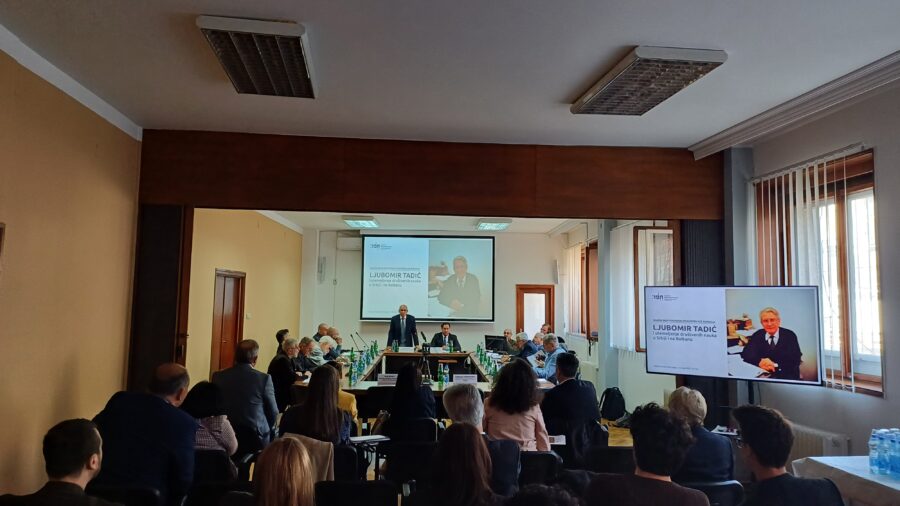On May 14, 2025, from 10 AM to 6 PM, a scientific conference was held at the Institute of Social Sciences to mark the centenary of the birth of Academician Ljubomir Tadić, titled “Ljubomir Tadić and the Foundation of Social Sciences in Serbia and the Balkans.” The event was attended by distinguished scholars, professors, and professionals from various fields of the social sciences.
The conference was opened by Dr. Neven Cvetićanin, Chair of the Program Committee, who welcomed the participants and shared several theses on the significance of Tadić’s work, presenting them as working hypotheses that would be examined throughout the panels and discussions in order to reach credible conclusions regarding Tadić’s legacy. Following this, the Director of the Institute of Social Sciences, Dr. Goran Bašić, also welcomed the attendees and read a commemorative address on the importance of Tadić’s work.
The first session of the conference, “Ljubomir Tadić as a Political Scientist,” began with an introduction by Prof. Dr. Bojan Vranić from the Faculty of Political Sciences, who acted as the session coordinator. He emphasized that, in his view, Tadić did not seek to dismantle existing systems but to build upon them. He then gave the floor to Prof. Dr. Dragan Simić, also from the Faculty of Political Sciences, who highlighted Tadić’s Renaissance approach to political science—a quality previously lacking in the field of political science in the Serbia and the Balkans —emphasizing its erudite and encyclopedic character. Prof. Dr. Dušan Pavlović, also from the same faculty, followed, stressing that Tadić’s emphasis on Hobbes as a key thinker for understanding politics marked a paradigm shift away from Marxist orthodoxy, although Tadić still considered himself a Marxist, as he believed class conflict underlies all social conflict. Next, Prof. Dr. Zoran Stojiljković spoke on the topic of legitimacy and revolution in Tadić’s work, noting that Tadić himself probably would not have liked to be categorized strictly as a political scientist, as he viewed political science as an unfinished discipline.
The second session, “Ljubomir Tadić as a Philosopher,” was opened by Prof. Dr. Jovan Babić from the Faculty of Philosophy, who served as moderator and addressed Tadić’s relationship with Marxism. He then gave the floor to Prof. Dr. Bogoljub Šijaković from the Orthodox Theological Faculty, who discussed Tadić’s concept of “philosophy in time,” concluding that our culture must rely on significant figures like Tadić. Dr. Neven Cvetićanin then shared his view of Tadić as an embodiment of Aristotelian phronesis, or practical wisdom, supporting this perspective with concrete examples from Tadić’s life and work. The session concluded with a speech by Prof. Dr. Stefan Mićić from the Faculty of Philosophy, who lamented the local tendency to undervalue predecessors while overvaluing foreign contributions, and spoke about generational receptions of Tadić’s work.
The third session, “Ljubomir Tadić as a Sociologist,” was opened by Dr. Neven Cvetićanin, who moderated the session and immediately gave the floor to Prof. Dr. Mladen Lazić from the Faculty of Philosophy. Lazić noted that Tadić’s sociology of history was grounded in socialism and a belief that history progresses toward a positive goal where freedom and justice ultimately prevail. He also emphasized the theoretical ruptures that gave rise to the Praxis group, of which Tadić was a member. Prof. Dr. Vladimir Vuletić, also from the Faculty of Philosophy, raised two crucial questions about Tadić’s work and views: whether Tadić underwent an ideological transformation—from socialist internationalism to nationalist liberalism—and what he might say about today’s social situation in Serbia. This prompted a fruitful discussion among attendees, who concluded that Tadić was not an ideological convert but a thinker who adapted and expanded his views based on the social realities and what he perceived as the public good at any given time. It was agreed that he would likely in our time offer as well constructive perspectives and solutions of social divisions in the spirit of the broader societal interest.
After a lunch break, the fourth session, “Ljubomir Tadić as a Legal Theorist,” commenced with an opening lecture by academician Tibor Varady, a full member of the Serbian Academy of Sciences and Arts (SANU). Varady spoke about Tadić’s critical approach, which he consistently applied, arguing that the famous Marxist notion of “critique of all that exists” should include self-critique, not just critique of opponents. Academician Alpar Lošonc, also a full member of SANU, then discussed Tadić’s views on the concept of natural law, particularly in relation to Ernst Bloch’s work. Next, Prof. Dr. Jovica Trkulja from Faculty of Law presented on Tadić’s interviews and polemics, placing them within a broader historical and social context. The final speaker in this session was Prof. Dr. Jasmina Hasanbegović, as well from the Faculty of Law, who focused on Tadić’s contributions to legal theory literature, concluding that we all remain indebted to him for the significant advancements he made across various branches of the social sciences.
The fifth and final session, “Ljubomir Tadić as a Person,” began with a speech by Prof. Dr. Dragoljub Mićunović, a veteran of Serbian social sciences and politics and a long-time friend of Tadić. Through an anecdote about Tadić’s courageous individual dissent during the communist era—when such actions were dangerous—Mićunović illustrated that Tadić possessed a heroic character that could not tolerate cowardice. Next, Jagoš Đuretić, director of the publishing house “Albatros Plus” and another long-time friend, spoke about Tadić’s personal integrity, saying he lived his philosophy and was consistent in both word and deed. Boris Tadić, son of Ljubomir Tadić and former President of Serbia, then spoke about the difficult circumstances in which his father lived and worked, emphasizing his bravery and his willingness to risk his life for his beliefs, which were largely centered on liberty and social democracy. Finally, Dr. Neven Cvetićanin closed the session and the entire conference by synthesizing the theoretical insights and personal impressions about Academician Tadić, thanking the participants for their presence throughout the day and formally concluding the event.

